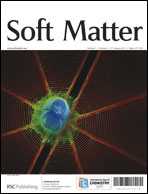Soft Matter (journal)
| Soft Matter | |
|---|---|
 | |
| Abbreviated title (ISO 4) | Soft Matter |
| Discipline | Interdisciplinary |
| Language | English |
| Edited by | Liz Davies |
| Publication details | |
| Publisher | Royal Society of Chemistry (United Kingdom) |
| Publication history | 2005 to present |
| Impact factor (2011) | 4.390 |
| Indexing | |
| ISSN |
1744-683X (print) 1744-6848 (web) |
| LCCN | 2005252381 |
| CODEN | SMOABF |
| OCLC number | 60579554 |
| Links | |
Soft Matter is a peer-reviewed scientific journal publishing original (primary) research and review articles on the generic science underpinning the properties and applications of soft matter. Soft Matter is published 48 times a year by the Royal Society of Chemistry.
Liz Davies is the Editor of Soft Matter.
Soft Matter was launched in 2005 and is one of the highest impact factor journals of its field.[1] While the journal was initially published as 12 issues a year, as submissions increased, the journal switched in 2009 to 24 issues a year [2] and 48 issues a year in 2012.
Subject coverage
- Soft Matter publishes articles on the following topics
- Bulk soft matter assemblies including polymers, colloids, gels, vesicles, emulsions, films, surfactants, micelles, suspensions and liquid crystals
- Soft nanotechnology and self-assembly including nanostructured polymeric materials, nanocomposites, molecular self organisation, supramolecular systems, molecular imprinting, molecular recognition, encapsulation and self-assembled films and monolayers
- Biological aspects of soft matter including biomacromolecules and biopolymers, membranes, biocomposites, and biomimetic materials
- Surfaces, interfaces, and interactions including thin films, Langmuir monolayers and Langmuir Blodgett techniques, wetting/dewetting, soft interfaces and their interfacial properties, dynamics, rheology and hydrodynamics, structure, pattern formation and replication
- Building blocks/synthetic methodology including new molecular architectures and new synthetic methodologies, and synthesis of soft materials
- Theory, modelling, and simulation including dynamics and non-equilibrium dynamics, computational and thermodynamic studies of soft materials
Article types
Soft Matter publishes the following types of articles: Research Papers (original scientific work); Communications (original scientific work that is of an urgent nature); Reviews (critical appraisals of topical areas of research); Highlights (short review articles that single out important new developments and explain the significance of the work) ; Emerging Areas (short accounts of a potentially important and growing new field of research); Tutorial Reviews (an essential introduction to a particular area of soft matter); and Opinions (a personal, often speculative, viewpoint or hypothesis on a topic of current interest). Reviews, Highlights, Emerging Areas, Tutorial Reviews and Opinions are written by special invitation of the Editor or Editorial Board only.
Audience (readership)
Soft Matter has a global circulation and interdisciplinary audience with a particular focus on the interface between physics, materials science, biology, chemical engineering and chemistry. Soft Matter appeals to a wide variety of researchers, but particularly to: materials scientists; surface scientists; physicists; biochemists; biological scientists; chemical engineers; physical, organic and theoretical chemists.
See also
- List of scientific journals in chemistry
- List of scientific journals
- Journal of Materials Chemistry
References
- ↑ Softmatter still top of the field, 18 June 2008
- ↑ Gibb, K; Steiner, U (2009). "Five years on". Soft Matter (Royal Society of Chemistry) 5 (1): 20–22. Bibcode:[http://adsabs.harvard.edu/abs/2009SMat....5...20. 2009SMat....5...20.]. doi:10.1039/B820595G.